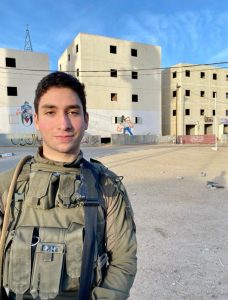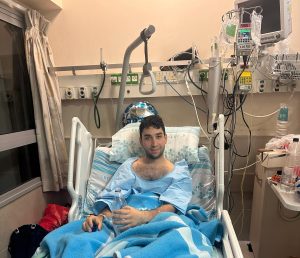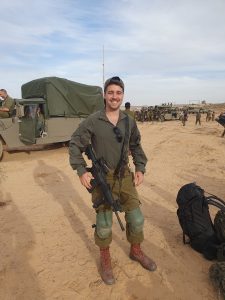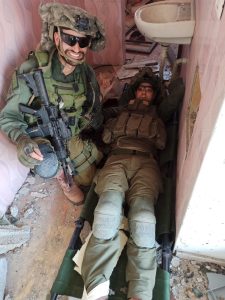From War to Campus
Yuval Zarkovsky, a student in the Faculty of Civil and Environmental Engineering, was injured while on duty in the north. Yair Tikotzky, a student in the Taub Faculty of Computer Science, was injured in Gaza. The Technion supports them, along with dozens of other students, in their daily routines and studies.
Since the start of the war, more than 3,000 IDF soldiers have been injured, including dozens of Technion students. The Dean of Students Office supports them and their families from the moment they receive the news of the injury until today. Many of the injured have already returned to their studies, receiving assistance according to their needs – academic help, financial aid, dormitory support, and emotional and psychological assistance.
The Technion’s psychological services have opened support groups for soldiers who were in life-threatening situations, both injured and uninjured reservists, to process their experiences and feelings. Those interested in further individual treatment were provided with fully funded therapy by the Dean of Students Office. Severely injured students living in the dormitories received a full rent exemption until they return to the Technion.
“One of our first tasks when the war broke out was to compile the names and details of the injured students,” says Dean of Students, Prof. Ayelet Fishman. “As soon as we received the information, the Student Counseling and Support Center advisors contacted the injured or their relatives to see how we could help. I also personally contacted the injured.”
Prof. Fishman states, “Unfortunately, I cannot heal the injured students, but in my role, I can assist them financially, whether it’s funding rent or psychological treatment, providing favorable loans, funding tutoring sessions and online courses, and if necessary, even financing a taxi from the hospital to the Technion every morning. I thank the Technion administration and the friends of the Technion in Israel and worldwide for the extensive assistance that enabled our office staff to respond to every student. Above all, it is important to me that they receive personal and humane attention from all the parties in the Dean of Students Office. I appreciate their service and sacrifice for the sake of all the citizens of the country and wish them and all the injured a speedy recovery.”
Yuval Zarkovsky: “The injury won’t change the course of my life”
On October 7, 2023, Yuval Zarkovsky, 22, a student in the Faculty of Civil and Environmental Engineering, was staying at his mother’s house in Herzliya. “Last year I did a summer semester and in early October, I was preparing for exams.”
There was no doubt that as a combat soldier he would be called to duty. Indeed, two weeks later, his unit was conscripted; first to the north, then to Gaza, and then back to the north. In the north he met a female soldier, and soon they became a couple. On December 7, she was discharged and he remained on duty. The next day, an event occurred that changed his life.
On the afternoon of December 8, the position where Yuval was stationed was bombed, and the building collapsed on him and another soldier. He recalls, “Only my leg was injured, but the other soldier was literally buried under the rubble; I couldn’t believe he would make it out. Fortunately, he did.”
Yuval vividly remembers the moment of impact. “I applied a tourniquet to myself and sent a text message to my mom and my girlfriend to say that I was injured. Someone arrived, reinforced my tourniquet, and went to treat the other injured soldiers. One of the combat soldiers came and escorted me to a protected area. I was treated there and later flown with the other injured soldier by helicopter to the Rambam Health Care Campus in Haifa.”
At Rambam, Yuval was informed that they would likely have to amputate his leg. Initially, there was some hesitation, but within a few days, the decision was clear; the amputation was necessary. “I realized there was no choice and accepted it. I also received a prosthesis and rehabilitation at the Beit HaLochem (IDF Disabled Veterans Center), where I am still working on strengthening my upper body and practicing walking.” Today, he is able to walk without crutches, and according to his doctors, he will fully return to function after the rehabilitation process.
Following the injury, he travelled to the United States with a delegation from the “B’lev Ehad” (One Heart) association, which assists the sick, elderly, and needy. There he met donors and doctors, and was shown an advanced prosthetic unlike his own; later, he received such a prosthesis. The new prosthesis has improved his walking ability.
He started the semester remotely, and only recently returned in person to studies at the Technion. “At the beginning of the semester, I only came to the lab sessions because they can’t be done remotely and they are very difficult to catch up on if you miss them. I want to emphasize the tremendous help I received from the from the lecturers and administrative staff of the Faculty.”
He doesn’t think the injury will change the course of his life. “I came to the Technion to study civil engineering from a love of engineering and construction. I have five more semesters to go, so there is still plenty of time to decide what I will do next.”
Yair Tikotzky: Taxis funded by the Technion
Captain (Res.) Yair Tikotzky, 25, grew up in Nahariya and studied computer science in high school. After his military service in the Paratroopers’ Regiment and Nahal Brigade, he was discharged as a squad commander and went on a trip abroad. Upon his return from the trip about two years ago, he began studying at the Technion in the Henry and Marilyn Taub Faculty of Computer Science. He said that, “even before the war, I had to do a lot of reserve duty during the semester. Last year in the winter semester, the unit conducted training. During the last spring semester, the unit carried out operational activity in Samaria.”
Events on October 7 found him in his apartment in Nesher preparing for exams, and on the same day he was called up. “We started travelling to our base to equip ourselves, but the terrible news from the south began to break, and we received an order to travel in our own cars to the Gaza Envelope in order to save whoever we could,” he said. “While we were on the way there, they sent us back to the unit; all the soldiers arrived, and we got organized. The next day, on October 8, we were sent to the north. I was moved from my unit to the unit of a friend of mine, Captain (Res.) Itay Mizrahi, and joined him as an additional officer in the Paratroopers’ 55th Brigade in reserves.” After a period in the north, the unit was called south to prepare for a ground entry into the Gaza Strip. They trained until they were well prepared, and “as soon as the command came, we confidently entered the strip.”
Brigade 55 entered Khan Yunis and stayed there to secure the entry axis. “The first day was particularly challenging. While we were leading the force, hours after crossing the border, we were fired upon by terrorists and lost a soldier in the platoon. A few weeks later during tunnel detection activity, a missile was fired at us; it killed a soldier from the platoon accompanying us. I managed to identify the source of the fire and we immediately took cover; many lives were saved.”
On December 25, while shooting at a suspicious building, Yair’s leg was caught in a wave of stones and metal, and he collapsed under 30 kilograms of gear. “I fell and couldn’t move. I shouted to my friends, who thought I was hit by a bullet, and they rescued me. Because of the adrenaline I didn’t feel much pain; the medical team thought it was a sprain, so they gave me morphine and sent me home. The next day, I went to hospital, and it turned out to be a broken ankle, and no less problematic – torn ligaments. Thus began a prolonged process of recovery.”
And then the semester at the Technion began. “The semester was postponed to January 14 out of consideration for reservists, but I didn’t know if I would be able to study on campus so early in the recovery process. I started studying remotely, and after a few weeks I returned to my apartment in Nesher and hoped I would be able to cope. To my delight, the Technion came to my aid. The Dean of Students Office provided me with a taxi from my apartment to the Technion and back. It was very meaningful to sit in class, to meet friends, to feel part of the semester. In general, I feel that there is a lot of consideration and understanding at the Technion for the reservists’ situation. Course instructors called to say they would help me adjust. It’s very heartening.”
One of Yair’s messages to the other reservists is the importance of psychological treatment. “It’s something that has helped me a lot, and I recommend that anyone who was in the reserves in wartime takes advantage of this option. Sometimes everything seems okay, both in how a person feels and in what they outwardly project, and yet there are processes happening internally. So, I think you need to go for treatment to make sure you’re taking care of yourself.”






